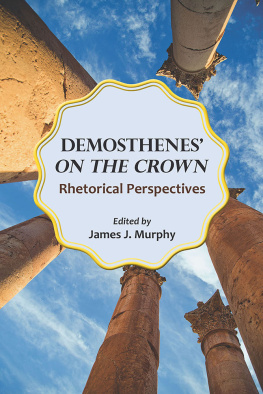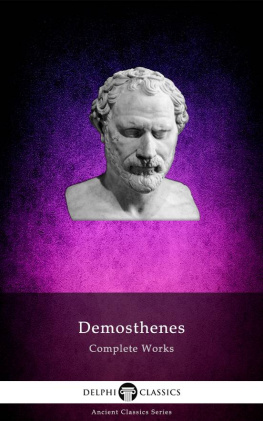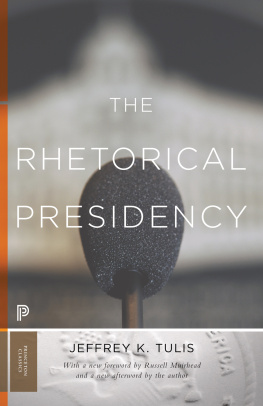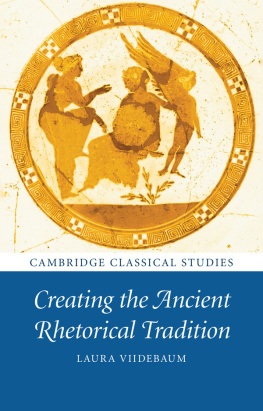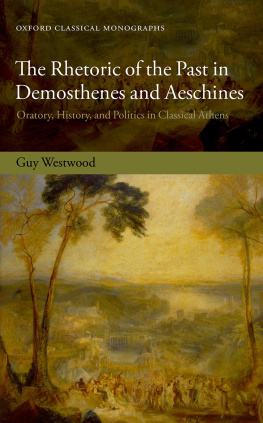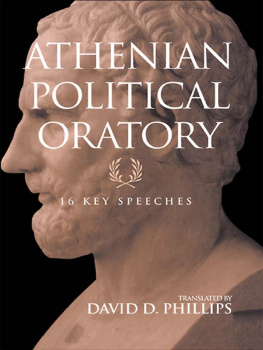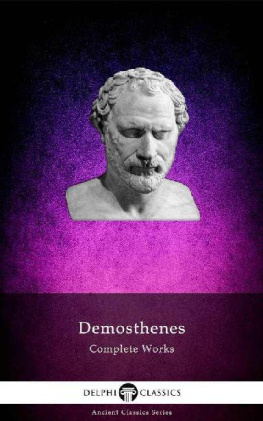Démosthène - Demosthenes On the crown: rhetorical perspectives
Here you can read online Démosthène - Demosthenes On the crown: rhetorical perspectives full text of the book (entire story) in english for free. Download pdf and epub, get meaning, cover and reviews about this ebook. City: Carbondale, year: 2016, publisher: Southern Illinois University Press, genre: Romance novel. Description of the work, (preface) as well as reviews are available. Best literature library LitArk.com created for fans of good reading and offers a wide selection of genres:
Romance novel
Science fiction
Adventure
Detective
Science
History
Home and family
Prose
Art
Politics
Computer
Non-fiction
Religion
Business
Children
Humor
Choose a favorite category and find really read worthwhile books. Enjoy immersion in the world of imagination, feel the emotions of the characters or learn something new for yourself, make an fascinating discovery.
- Book:Demosthenes On the crown: rhetorical perspectives
- Author:
- Publisher:Southern Illinois University Press
- Genre:
- Year:2016
- City:Carbondale
- Rating:4 / 5
- Favourites:Add to favourites
- Your mark:
- 80
- 1
- 2
- 3
- 4
- 5
Demosthenes On the crown: rhetorical perspectives: summary, description and annotation
We offer to read an annotation, description, summary or preface (depends on what the author of the book "Demosthenes On the crown: rhetorical perspectives" wrote himself). If you haven't found the necessary information about the book — write in the comments, we will try to find it.
Démosthène: author's other books
Who wrote Demosthenes On the crown: rhetorical perspectives? Find out the surname, the name of the author of the book and a list of all author's works by series.
Demosthenes On the crown: rhetorical perspectives — read online for free the complete book (whole text) full work
Below is the text of the book, divided by pages. System saving the place of the last page read, allows you to conveniently read the book "Demosthenes On the crown: rhetorical perspectives" online for free, without having to search again every time where you left off. Put a bookmark, and you can go to the page where you finished reading at any time.
Font size:
Interval:
Bookmark:

Landmarks in Rhetoric and Public Address

Southern Illinois University Press
www.siupress.com
Copyright 2016 by the Board of Trustees, Southern Illinois University
copyright 2016 by Richard Leo Enos
This book is a revised version of Demosthenes On the Crown: A Critical Case Study of a Masterpiece of Ancient Oratory, published by Hermagoras Press in 1983.
All rights reserved
Printed in the United States of America
19 18 17 16 4 3 2 1
Cover illustration: Artemis temple columns. iStock.com / Ahmad Atwah
Library of Congress Cataloging-in-Publication Data
Names: Murphy, James Jerome, editor. | Demosthenes. On the crown. English.
Title: Demosthenes on the crown : rhetorical perspectives / edited by James J. Murphy.
Description: Carbondale : Southern Illinois University Press, 2016. | Series: Landmarks in Rhetoric and Public Address | Includes bibliographical references and index. | This book is a revised version of Demosthenes On the Crown: A Critical Case Study of a Masterpiece of Ancient Oratory, published by Hermagoras Press in 1983.
Identifiers: LCCN 2016012977 | ISBN 9780809335107 (paperback) | ISBN 9780809335114 (e-book)
Subjects: LCSH: Demosthenes. On the crown. | Rhetoric, AncientHistory and criticism. | Oratory, Ancient | BISAC: LANGUAGE ARTS & DISCIPLINES / Rhetoric. | LANGUAGE ARTS & DISCIPLINES / Speech. | LANGUAGE ARTS & DISCIPLINES / Communication Studies.
Classification: LCC PA3950.C6 D4 2016 | DDC 885/.01dc23 LC record available at http://lccn.loc.gov/2016012977
James J. Murphy
Next comes the vast army of oratorsso vast that a single age produced ten of them at Athens. Of these, Demosthenes was by far the greatest, almost a law of oratory in himself: such is his force, the concentration of his thought, his muscular firmness, his economy, his controlone feels that there is nothing lacking and nothing superfluous.
Quintilian, Institutio oratoria, 10.1.76
THE RENOWN OF DEMOSTHENES
This praise of Demosthenes by the Roman rhetorician and educator Marcus Fabius Quintilianus about the year 95 in the first Christian century is typical of Demosthenes reputation in the more than two thousand years since he delivered his most famous oration, On the Crown, in 330 BCE.
Even his opponent on that occasion, Aeschines, who went into exile following his defeat in this famous case, later praised his speech to the students he was instructing on the island of Rhodes. The story is told that Aeschines had been declaiming his own crown speech to the students, who marveled that such a fine performance could still have failed to gain one-fifth of the votesthe minimum necessary under Athenian law to avoid a fine in such cases. But oh, Aeschines said, if only you had heard Demosthenes!
The Roman orator Cicero was so entranced by the speech that he translated it into Latin together with that of Aeschines. Unfortunately the translations
Later scholars so admired the oration On the Crown that they attempted to fill gaps in the text where Demosthenes refers to long-lost decrees and letters by inserting their own versions of these documents.
The speech was first printed in 1504 and has never been out of print since. In early modern times it was esteemed by such educators as Philip Melanchthon. In fact the English scholar Roger Ascham met regularly with Queen Elizabeth to read aloud the works of Demosthenes. Later Lord Brougham, a prominent English rhetorical critic, made the orator a prime example of successful oratory. In 1742 the philosopher and historian David Hume argued in Of Eloquence that Demosthenes, with his force and energy, set the standard for true taste. The Edinburgh professor Hugh Blair, whose Lectures on Rhetoric and Belles Lettres (1783) was to have immense influence in the United States, placed Demosthenes above Cicero as an orator and ranked both of them as superior to any modern orator. Demosthenes was also heralded in the United States by such men as Chauncey Goodrich in his Yale lectures from 1822 onward.
During the early part of the twentieth century the stresses of World War I spurred still another type of interest in Demosthenes. Admired by the French for his staunch resistance to the invading Macedonians, Demosthenes was eulogized as a patriot by Premier Georges Clemenceau. On the other hand, some German writers criticized Demosthenes for pursuing the petty interests of lawyers against the great Macedonian King Philip.
As the bibliography shows, scores of writers have studied Demosthenes over the past two centuries. In recent years there has been a resurgence of scholarly interest in Demosthenes, marked by a spate of books about him. These include Demosthenes: Statesman and Orator, edited by Ian .mosthenes the Orator (Oxford: Oxford University Press, 2009); Cecil W. Wooten, Ciceros Philippics and Their Demosthenic Model: The Rhetoric of Crisis (Chapel Hill: University of North Carolina Press, 1983); Craig A. Gibson, Interpreting a Classic: Demosthenes and His Ancient Commentators (Berkeley: University of California Press, 2002); and Ian Worthington, Demosthenes of Athens and the Fall of Classical Greece (Oxford: Oxford University Press, 2013).
Meanwhile the University of Texas Press has undertaken the translation of all of Demosthenes speeches in a series edited by Michael Gagarin.Demosthenes On the Crown (speech 18) is translated by Harvey Yunis in Demosthenes, Speeches 18 and 19 (Austin: University of Texas Press, 2005).
Clearly, interest remains strong for what Charles Rann Kennedy has called the greatest speech of the greatest orator in the world. And a speech that has been renowned for twenty-four centuries can surely tell us much about our own approach to the use of persuasion.
THE GOAL OF THIS VOLUME
It is our intention to make Demosthenes On the Crown come alive by recreating the circumstances of his speech, presenting a translation, and then offering detailed rhetorical evaluations, employing the four analytic approaches suggested by Demosthenes famous contemporary, Aristotle (384322 BCE), whose Rhetoric was the first comprehensive attempt to understand the elements of persuasive speech.
Aristotle states flatly that there are two parts of a speech; for it is necessary [first] to state the subject, and [then], to demonstrate it (Rhetoric 3.1). Consequently a large portion of his Rhetoric is concerned with methods of demonstration or proofthat is, ways in which a speaker can lead (persuade) an audience to agree with his position. Aristotle says that there are two kinds of proof, first what he calls nonartistic or preexisting proofs, which lie outside the control of the speaker; examples are laws, witness testimony, and contracts. But it is to the second type, artistic proofsthat is, proofs artistically created by the speakerthat he devotes his greatest attention.
Aristotle names three types of artistic proofs derived respectively from the speaker, the audience, and the speech.
There is persuasion through character ( ethos ) of the speaker whenever the speech is spoken in such a way as to make the speaker worthy of credence. (Rhetoric 1.2.4)
There is persuasion through the hearers when they are led to feel emotion ( pathos ) by the speech. (Rhetoric 1.2.5)
There is persuasion through the arguments ( logoi ) when we show the truth or apparent truth from whatever is persuasive in each case. (
Font size:
Interval:
Bookmark:
Similar books «Demosthenes On the crown: rhetorical perspectives»
Look at similar books to Demosthenes On the crown: rhetorical perspectives. We have selected literature similar in name and meaning in the hope of providing readers with more options to find new, interesting, not yet read works.
Discussion, reviews of the book Demosthenes On the crown: rhetorical perspectives and just readers' own opinions. Leave your comments, write what you think about the work, its meaning or the main characters. Specify what exactly you liked and what you didn't like, and why you think so.

